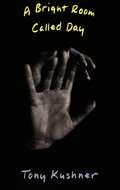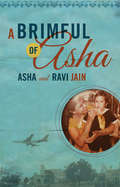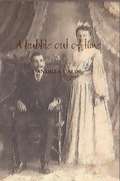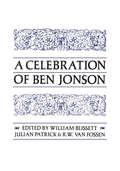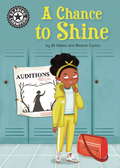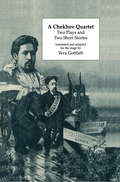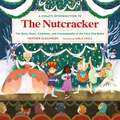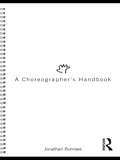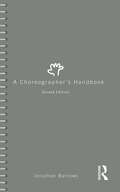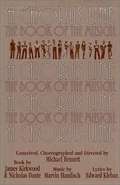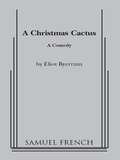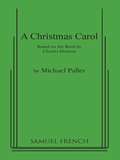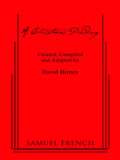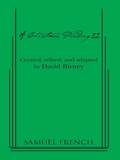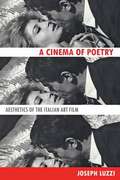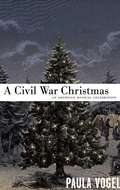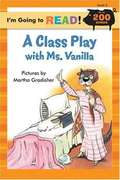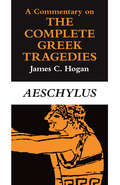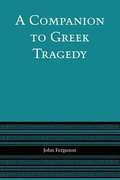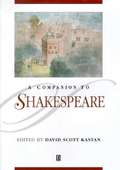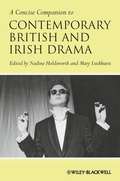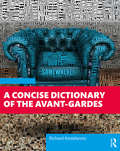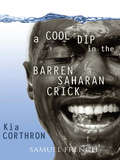- Table View
- List View
A Bright Room Called Day
by Tony KushnerFrom the Pulitzer Prize-winning author of Angels in America comes this powerful portrayal of individual dissolution and resolution in the face of political catastrophe."It's brash, audacious and...intoxicatingly visionary."--Sid Smith, Chicago Tribune
A Brimful of Asha
by Ravi Jain Asha JainIn 2007 Ravi Jain completed school and was itching to get his feet wet in the theatre scene. With plans to begin his own company, Ravi put off marriage for a few years, much to the disappointment of his mother, Asha, who was getting impatient with Ravi's non-traditional approach to life. In this autobiographical story of the Jain family, Ravi recalls a trip to India with his parents in tow, where they ambushed him with a series of prospective wives at every turn. Conveyed through storytelling, A Brimful of Asha is a comedic and heartwarming tale of a family caught between two cultures.
A Bubble out of time
by Silvia De Cristofaro Andrea Calo'If it was true we all live more than one life? If we grew up remembering one of our past lives? Mystery and passion blended in a page turner novel! Katherine, called Kate by everybody, is an Italian American young woman who lives in New York. Many people are sure she has mental issues, her family included. But that's not true: her distinctive trait is to clearly remember details of her past life, a life she lived in a place far from her birthplace. At thirty five she decides to go back to Joseph, in Wallowa county, Oregon, where she's sure she had lived. She's looking for her past, for her soul closed in the body of a past time woman. When she's forced to stop in Portland because of a snow storm, she meets John and she feels an unexplainable connection with him. He will offer to help her look for traces of the past that doesn't stop to haunt her. A painting, a kiss, a house and a journal written by herself in the second half of 1800, everything leads to a breath taking revelation saved for an end that has the ability to make this novel unforgettable.
A Celebration of Ben Jonson
by William F. Blissett Julian Patrick R.W. Van FossenThe papers in this volume were given by some of the world's foremost Jonsonian scholars at a conference at the University of Toronto which marked the 400th anniversary of his birth. Each contributor came from a different institution, and Canada, the United States, Great Britain, and New Zealand were represented. The balance of papers likewise reflects the range of Ben Jonson's achievement and the combination of brio and control so characteristic of him.The papers arrange themselves in pairs: 'The Incredibility of Jonsonian Comedy,' as discussed by Professor Clifford Leech, is of a piece with distrust and defiance of the audience as discussed in the paper 'Jonson and the Loathèd Stage' by Professor Jonas Barish; Professor George Hibbard in 'Ben Jonson and Human Nature' and Professor D.I. McKenzie in 'The Staple of News and the Late Plays' offer critical assessment of plays, the one wide-ranging, the other closely focused on a previously neglected play; and Professor H.N. Maclean in '"A More Secret Cause": The Wit of Jonson's Poetry' and Professor L.C. Knights in 'Ben Jonson: Public Attitudes and Social Poetry' approach the difficult and rewarding task of defining Jonson's poetry of appraisal in different but complementary styles.
A Chance to Shine: Independent Reading 18 (Reading Champion #457)
by Jill AtkinsLily hates her athletics training but wants to please her parents, though she'll never be as good as her brother, Abe. One day she spots an audition poster at school and discovers her chance to shine lies on the stage, not on the athletics track ... This first colour chapter book is a perfectly levelled, accessible text for Key stage 2 readers aged 10-11 or in year 6. Reading Champion offers independent reading books for children to practise and reinforce their developing reading skills.Fantastic, original stories are accompanied by engaging artwork and activities to provoke deeper response and encourage writing. Each book has been carefully graded so that it can be matched to a child's reading ability, encouraging reading for pleasure.The Key Stage 2 Reading Champion Books are suggested for use as follows:Independent Reading 11: start of Year 3 or age 7+Independent Reading 12: end of Year 3 or age 7+Independent Reading 13: start of Year 4 or age 8+Independent Reading 14: end of Year 4 or age 8+Independent Reading 15: start of Year 5 or age 9+Independent Reading 16: end of Year 5 or age 9+Independent Reading 17: start of Year 6 or age 10+Independent Reading 18: end of Year 6 or age 10+
A Chekhov Quartet
by Vera GottliebFirst Published in 1996. Translated from Chekhov's short plays and adapted from his stories by Vera Gottlieb, this collection consists of four one-act plays. Short though they are, each contains a whole range of dramatic possibilities and presented together the plays form a coherent programme, offering performers and audiences an intimate theatrical experience ranging from high comedy to sombre analysis. Both student and professional actors will find an opportunity to display all their powers of invention, characterisation, timing, audience control, concentration and finesse. A Chekhov Quartet has been performed in London, Moscow and at the 1990 Chekhov Festival in Yalta
A Child's Introduction to the Nutcracker: The Story, Music, Costumes, and Choreography of the Fairy Tale Ballet (A Child's Introduction Series)
by Heather AlexanderBallet enthusiasts of all ages will delight in the magical story of The Nutcracker and the magnificent ballet it inspired in this enchanted book packed with colorful illustrations, fun facts, history, music, and the love of dance. Whether The Nutcracker is your first ballet experience or you&’re already a master dancer, everything you love and want to know about this special, sugar-spun, snow-dusted ballet can be found in these delightful pages. Follow The Nutcracker as it makes its way from page to stage to become the world&’s most popular holiday ballet. Learn all about the dazzling steps, spins, and jumps choreographed by Petipa, Ivanov, and Balanchine, and meet the famed composer Tchaikovsky. Special sections highlight some of the most famous dancers and companies that have brought the performance and the magic of this ballet to life.Packed with charming illustrations showcasing the beautiful costumes and lavish sets, plus removable poster for you to color, A Child&’s Introduction to the Nutcracker lets you to enjoy this magical ballet all year round!
A Choreographer's Handbook
by Jonathan BurrowsOn choreography: "Choreography is a negotiation with the patterns your body is thinking" On rules: "Try breaking the rules on a need to break the rules basis" A Choreographer’s Handbook invites the reader to investigate how and why to make a dance performance. In an inspiring and unusually empowering sequence of stories, ideas and paradoxes, internationally renowned dancer, choreographer and teacher Jonathan Burrows explains how it’s possible to navigate a course through this complex process. It is a stunning reflection on a personal practice and professional journey, and draws upon five years’ of workshop discussions, led by Burrows. Burrows’ open and honest prose gives the reader access to a range of exercises, meditations, principles and ideas on choreography that allow artists and dance-makers to find their own aesthetic process. It is a book for anyone interested in making performance, at whatever level and in whichever style.
A Choreographer's Handbook
by Jonathan BurrowsOn choreography: ‘Choreography is a negotiation with the patterns your body is thinking.’On rules: ‘Try breaking the rules on a need to break the rules basis.’The updated and revised edition of 'A Choreographer’s Handbook' invites the reader to investigate how and why to make a dance performance. In an inspiring and unusually empowering sequence of stories, questions, ideas and paradoxes, internationally renowned choreographer Jonathan Burrows explains how it’s possible to navigate a course through this complex process.It is a stunning reflection on a personal practice and professional journey, and draws upon many years of workshop discussions, led by Burrows.Burrows’ open and honest prose gives the reader access to a range of principles, exercises, meditations and ideas on choreography that allow artists and dance-makers to find their own aesthetic process.It is a book for anyone interested in making performance, at whatever level and in whichever style.
A Chorus Line
by James Kirkwood Michael Bennett Nicholas DanteIt is hard to believe that over 25 years have passed since A Chorus Line first electrified a New York audience. The memories of the show's birth in 1975, not to mention those of its 15-year-life and poignant death, remain incandescent - and not just because nothing so exciting has happened to the American musical since. For a generation of theater people and theatergoers, A Chorus Line was and is the touchstone that defines the glittering promise, more often realized in legend than in reality, of the Broadway way. This impressive book contains the complete book and lyrics of one of the longest running shows in Broadway history with a preface by Samuel Freedman, an introduction by Frank Rich and lots of photos from the stage production.
A Christmas Cactus
by Eliot ByerrumComedy / 4m, 2fScenery: Combined Interior and Exterior. Christmas Eve is tough for private investigator Cactus O'Riley, a white hot redhead with the holiday blues. She is trying to lure her secretary Fred away from his protective mother, dodging the affections of Deputy D.A. Windsor, and considering closing her business. She doesn't need the added aggravation of two fugitives who burst into her office looking for justice and a dead detective named Jake Marley. Cactus also doesn't need Fred's mother, who arrives to take Fred home but decides to stay because she thinks this is the Christmas murder mystery party she has always dreamed of attending. Christmas turns into a dickens of a holiday for Cactus as she solves mysteries, delivers small miracles and takes a second chance on love and sleuthing. Comedy, mystery and romance converge in this charming contemporary Christmas tale where goodwill and justice triumph.
A Christmas Carol
by Charles DickensEbenezer Scrooge was a lonely miser of a man, the meanest there ever was. He only loved money, and even when his best friend died, all he could think of was how to save on the funeral. One Christmas eve, Scrooge was visited by three spirits. The experience that he underwent with them shook his conscience--and his world. But did Scrooge change for the better? Charles Dickens in his inimitable style blends in emotions with high drama and conveys a powerful social message.
A Christmas Carol
by Michael PallerFull Length / Characters: 5 male, 2 female, 3 children Scenery: Composite set. This fresh approach to the classic tale faithfully conveys the magic of Dickens. On Christmas Eve in 1843 friends and family gathered at Dickens' home ask him to tell a story, but he refuses to work on Christmas Eve. If there is going to be a story, each must take a part in its telling. And so the story unfolds with the cast of 10 playing over 40 parts. "Done with respect and ingenuity. Deserves to be seen." Cleveland Free Press. "A treat ... for the whole family to enjoy." Cleveland Sunday Press.
A Christmas Pudding
by David BirneyEdited and adapted by David Birney / 3m., 3f., plus chorus 8 to 12 singers / Holiday Play with music /Simple Unit Set A Christmas celebration told in songs, stories, poems and tales by Dickens, Mark Twain, Shakespeare, Emily Dickinson, Shaw, Longfellow, St. Luke and many others collected with a host of traditional carols and holiday songs. This piece provides a perfect evening to warm hearts, stir memories and give laughter during the holiday season.
A Christmas Pudding II
by David BirneyHoliday Play with Music Character Descriptions: 3 male, 3 female, plus chorus of 8 to 12 singers Simple Set A Christmas celebration told in songs, stories, poems and tales by Dickens, Mark Twain, Frank McCourt, Emily Dickinson, Alfred Lord Tennyson, A.J. Carothers, and many others collected with a host of traditional carols and holiday songs. This piece provides a perfect evening to warm hearts, stir memories and give laughter during the holiday season. Also available from Samuel French: David Birney's original A Chrismas Pudding, which includes selections by Shakespeare, Shaw, Longfellow, St. Luke and many others! "David Birney's adaptation is an evening of song, poetry and stories that celebrates the spiritual dimensions of the season...from a diverse array of classic and modern texts, punctuated with musical interludes...[The] tone ranges from lighthearted whimsy to solemn reflection...humorous, wry...lighthearted...This is definitely a Christmas show...one (whose) openhearted sentiments send a message that's reassuringly inclusive." - The Los Angeles Times "A calorie-laden Christmas Pudding in Los Altos...a place to jump-start your holiday spirit as we enter the gratitude season of the year." - The Daily News, Los Altos, California
A Cinema of Poetry: Aesthetics of the Italian Art Film
by Joseph LuzziLuzzi's study is the first to show how Italian filmmakers address such crucial aesthetic issues as the nature of the chorus, the relation between symbol and allegory, the literary prehistory of montage, and the place of poetry in cinematic expression-what Pasolini called the cinema of poetry.
A Civil War Christmas
by Paula Vogel"A rich and moving play with music . . . it taps into seasonal themes of redemption, forgiveness and community, with a decidedly American bent."-VarietySet on a chilly Christmas Eve during the latter days of the Civil War, Paula Vogel's new pageant for the holiday season weaves a tapestry of both fictional and historical characters-together with period holiday music and lesser-known marches, hymns, and spirituals-to tell a story of peaceful companionship and communal hope.Paula Vogel's plays include How I Learned to Drive (winner of the Pulitzer Prize, OBIE, Drama Desk, and New York Drama Critics awards), The Long Christmas Ride Home, The Mineola Twins, The Baltimore Waltz, Hot 'N' Throbbing, and Desdemona. She is chair of the playwriting department at the Yale School of Drama, and is playwright-in-residence at Yale Repertory Theatre.
A Class Play With Ms. Vanilla
by Martha Gradisher Margot LinnMs. Vanilla's class is happy today; they're about to put on a play. Everyone is ready. The whole school is there. The curtain goes up, so on with the show. It's the story of Red Riding Hood, and every young actor is really so good. But there's something familiar about Big Bad Wolf. Guess who it is? It's Ms. Vanilla!
A Commentary on The Complete Greek Tragedies: Aeschylus
by James C. HoganThis commentary offers a rich introduction and useful guide to the seven surviving plays attributed to Aeschylus. Though it may profitably be used with any translation of Aeschylus, the commentary is based on the acclaimed Chicago translations, The Complete Greek Tragedies, edited by David Grene and Richmond Lattimore. James C. Hogan provides a general introduction to Aeschylean theater and drama, followed by a line-by-line commentary on each of the seven plays. He places Aeschylus in the historical, cultural, and religious context of fifth-century Athens, showing how the action and metaphor of Aeschylean theater can be illuminated by information on Athenian law athletic contests, relations with neighboring states, beliefs about the underworld, and countless other details of Hellenic life. Hogan clarifies terms that might puzzle modern readers, such as place names and mythological references, and gives special attention to textual and linguistic issues: controversial questions of interpretation; difficult or significant Greek words; use of style, rhetoric, and commonplaces in Greek poetry; and Aeschylus's place in the poetic tradition of Homer, Hesiod, and the elegiac poets. Practical information on staging and production is also included, as are maps and illustrations, a bibliography, indexes, and extensive cross-references between the seven plays. Forthcoming volumes will cover the works of Sophocles and Euripides.
A Commentary on the Complete Greek Tragedies: Aeschylus
by James C. HoganThis commentary offers a rich introduction and useful guide to the seven surviving plays attributed to Aeschylus. Though it may profitably be used with any translation of Aeschylus, the commentary is based on the acclaimed Chicago translations, "The Complete Greek Tragedies," edited by David Grene and Richmond Lattimore. James C. Hogan provides a general introduction to Aeschylean theater and drama, followed by a line-by-line commentary on each of the seven plays. He places Aeschylus in the historical, cultural, and religious context of fifth-century Athens, showing how the action and metaphor of Aeschylean theater can be illuminated by information on Athenian law athletic contests, relations with neighboring states, beliefs about the underworld, and countless other details of Hellenic life. Hogan clarifies terms that might puzzle modern readers, such as place names and mythological references, and gives special attention to textual and linguistic issues: controversial questions of interpretation; difficult or significant Greek words; use of style, rhetoric, and commonplaces in Greek poetry; and Aeschylus's place in the poetic tradition of Homer, Hesiod, and the elegiac poets. Practical information on staging and production is also included, as are maps and illustrations, a bibliography, indexes, and extensive cross-references between the seven plays. Forthcoming volumes will cover the works of Sophocles and Euripides.
A Companion to Greek Tragedy
by John FergusonThis handbook provides students and scholars with a highly readable yet detailed analysis of all surviving Greek tragedies and satyr plays. John Ferguson places each play in its historical, political, and social context--important for both Athenian and modern audiences--and he displays a keen, discriminating critical competence in dealing with the plays as literature. Ferguson is sensitive to the meter and sound of Greek tragedy, and, with remarkable success, he manages to involve even the Greekless reader in an actual encounter with the Greek as poetry. He examines language and metrics in relation to each tragedian's dramatic purpose, thus elucidating the crucial dimension of technique that other handbooks, mostly the work of philologists, renounce in order to concentrate on structure and plot. The result is perceptive criticism in which the quality of Ferguson's scholarship vouches for what he sees in the plays. The book is prefaced with a general introduction to ancient Greek theatrical production, and there is a brief biographical sketch of each tragedian. Footnotes are avoided: the object of this handbook is to introduce readers to the plays as dramatic poetry, not to detail who said what about them. There is an extensive bibliography for scholars and a glossary of Greek words to assist the student with the operative moral and stylistic terms of Greek tragedy.
A Companion to Shakespeare
by David S. KastanA Companion to Shakespeare is an indispensable book for readers of Shakespeare and anyone with an interest in his works. In 28 newly commissioned essays, this volume offers a remarkably innovative and comprehensive picture of the theatrical, literary, intellectual and social worlds in which Shakespeare wrote and produced his plays. <P>Each individual essay stands as an authoritative account of the state of knowledge in its field, and provides a new and compelling portrait of the historical conditions, both imaginative and institutional, that enabled (and in some cases inhibited) Shakespeare's great art. <P>Topics covered include the organization and regulation of Elizabethan playing, printing, and publication; the circulation of the play-texts: Shakespeare's reading; religion and political thought in England in late Elizabethan and Jacobean England: and the linguistic and literary environment in which he wrote.
A Concise Companion to Contemporary British and Irish Drama (Concise Companions to Literature and Culture)
by Nadine Holdsworth Mary LuckhurstFocusing on major and emerging playwrights, institutions, and various theatre practices this Concise Companion examines the key issues in British and Irish theatre since 1979. Written by leading international scholars in the field, this collection offers new ways of thinking about the social, political, and cultural contexts within which specific aspects of British and Irish theatre have emerged and explores the relationship between these contexts and the works produced. It investigates why particular issues and practices have emerged as significant in the theatre of this period.
A Concise Dictionary of the Avant-Gardes: Concise Edition
by Richard KostelanetzFor a concise edition of his legendary arts dictionary of information and opinion, the distinguished critic and arts historian Richard Kostelanetz selects entries from the 2018 third edition. Typically he provides intelligence unavailable anywhere else, no less in print than online, about a wealth of subjects and individuals. Focused upon what is truly innovative and excellent, Kostelanetz also ranges widely with insight and surprise, including appreciations of artistic athletes such as Muhammad Ali and the Harlem Globetrotters and such collective creations as Las Vegas and his native New York City. Continuing the traditions of cheeky high-style Dictionarysts, honoring Ambrose Bierce and Samuel Johnson (both with individual entries), Kostelanetz offers a "reference book" to be enjoyed, not only in bits and chunks but continuously as one of the ten books someone would take if he or she planned to be stranded on a desert isle.
A Cool Dip in the Barren Saharan Crick
by Kia CorthronDramaCharacters: 3 males, 2 femalesA Cool Dip offers glimpses into the lives of Abebe, a young Ethopian man with a passion for the unlikely combination of Christianity and ecology, and the family that houses him during his college studies in Maryland. Through their interactions, the play uncompromisingly tackles the issues of drought and social injustice, combining a realistic evocation of human emotion with the fantastical to bring attention to the scarcity of something we so often take for granted: water."Half family drama and half sociopolitical exposé, Cool Dip makes the socialand ecological issues surrounding water both compelling and fascinating, shedding new light on this most basic of necessities." -Show Business "Waxing its most lyrical, whether about activism of the environmental or evangelical varieties, it's one of the most refreshing of the season to date." -TalkinBroadway.com
